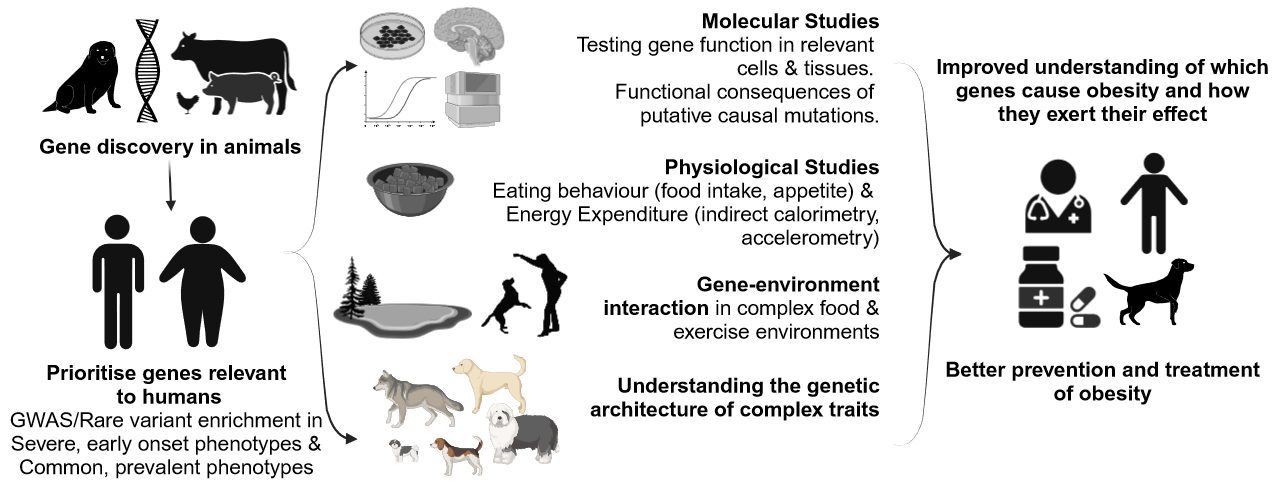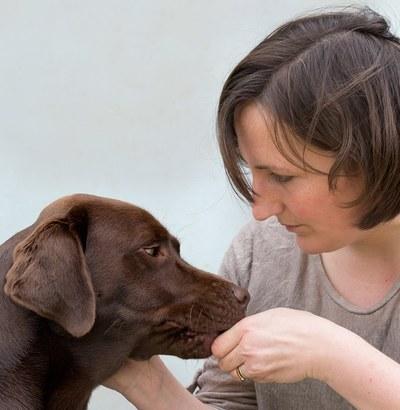Why are some individuals prone to obesity and yet others stay lean even when they live in a similarly 'obesogenic' environment? Obesity is highly heritable as are related metabolic traits. We study obesity genetics 'in the round' starting from genetic discovery studies using GWAS and other epidemiological approaches working with 'big data'. We try to ensure we maximise the value of our research for both veterinary medicine and to better understand human biology and medical science.
Capitalising on my background as a vet, we start with animal genetics – dogs, horses and farm animals are excellent models because selective breeding means they show phenotypes of interest and their genomes are conducive to gene mapping. We follow up genetics with cell studies to understand mechanism, focusing on neuronal development, cell signaling and adipocyte biology, including with transcriptomics. We also study whole body physiology in pet dogs volunteered by their owners.
It's important to us that our findings have a clinical impact - you can find some of our advice for owners of obesity prone pets, informed by our research, here.
Read on to find out more about our research and opportunities to work with us.
Biography
I spent 7 years working as a vet, in both first opinion and latterly specialist practice, training to be a specialist in small animal medicine. A PhD in the genomics of severe insulin resistance syndromes in humans followed and piqued my interest in the biology and specifically genetics of obesity, eating behavior and metabolism. Combining my veterinary and research training, I started the GOdogs research group in 2014 and have been working on veterinary genetics with a strong emphasis on translating those findings into human biomedicine ever since. After a Wellcome postdoctoral fellowship, I took up a University lectureship in this department but I retain an affiliation with the Institute of Metabolic Science, also in Cambridge. I offer a clinical obesity referral service via the Queens Veterinary School Hospital, Cambridge.
Research
I am interested in how genes influence metabolism. In dogs, selective breeding has resulted an unusual genetic architecture that makes mapping disease-associated loci remarkably tractable with much smaller numbers than in human populations. We study pet dogs and use comparative genomics to identify genes that are responsible for determining obesity susceptibility in dogs and humans. Employing both candidate and genome-wide approaches to gene and mutation discovery has been useful and we have studied Labradors, flatcoated retrievers, brachycephalic breeds and golden retrievers so far.
The mechanism of action and physiological consequences of variants of interest are tested in the lab in cellular models, and at a whole-animal level by examining their effect on eating behaviour and physiology. All our canine studies are carried out with volunteer owners and their pet or working dogs.
We also have research streams in production animals and horses. Selective breeding for milk and meat production means there are strong genetic influences on body composition in production animals which we investigate using cross breed, cross species and comparative approaches. In equines, dysregulation of insulin known as Equine Metabolic Syndrome is common in pony breeds. We are are using genetic and genomics approaches, combined with molecular studies of the function of putative candidate causal variants to identify new genetic and molecular mechanisms underlying these conditions and traits.
Our overall aim is to understand how genes link to obesity in both animals and humans, to reveal mechanistic links and identify targets to improve obesity prevention and treatment.
We also work on the clinical relevance of our findings and you can see some of our advice for owners of obesity prone pets here.
Lab Members
Dr Ben Keep: postdoctoral scientist (EEG to investigate cross species communication)
Enoch Alex: PhD candidate, Jameel Education Foundation Cambridge Scholarship.
Dr Anna Morros MRCVS: PhD Candidate, Morris Animal Foundation Veterinary Research Fellow.
Jade Scardham: PhD candidate, MRC iCASE Studentship.
And several super PDN Part II (3rd year undergraduate) students!
Lab Alumni (& first destinations)
Vincent Chua: MPhil in Biological Sciences, 2024. LinkedIn
Dr Natalie Wallis: BBSRC DTP Targetted Studentship, PhD 2024. Outputs Development Manager, University of Liverpool. LinkedIn
Dr Alyce McClellan: BBSRC DTP Studentship, PhD 2024. Postdoctoral scientist, UCL. LinkedIn
Tamas Berczik: MPhil 2023. Clinical veterinary student, RVC (2024). LinkedIn
Dr Eloise Cross: MPhil 2019. DPhil, Oxford. LinkedIn
Collaborators
Prof. Stephen O’Rahilly (Wellcome-MRC Institute of Metabolic Science)
Prof. Giles Yeo (Institute of Metabolic Science)
Dr David Sargan (Dept. Veterinary Medicine)
Prof John Perry and Prof Ken Ong (MRC Epidemiology Unit)
Dr Daniel Fazakerly (Institute of Metabolic Science)
Dr Caroline Gorvin (University of Birmingham)
Dr Valdas Noreika (QMUL)
Interested in Joining the Group?
Postdocs: The lab does not have any funded positions at the moment. However, if you are interested in our science and would like to discuss applying for fellowships (e.g., EMBO, HFSP, Sir Henry Wellcome, Newton International, L’Oréal-UNESCO, EU Marie Curie, Morris Animal Foundation) please contact Eleanor.
Graduate Students: The lab offers PhD projects to students accepted on the BBSRC or MRC Doctoral Training Programs (applications in the autumn), or who are successful in securing alternative funding, for instance via the Cambridge Trust. I may be able to support personal applications to funding to animal welfare charities (e.g. Morris Animal Foundation fellowships, Petsavers studentships). Please be mindful of eligibility criteria for Cambridge (e.g., academic, residency) and get in touch well before any deadlines if you are hoping for support with an application.
MPhil students are encouraged to apply to the taught programs administered from PDN (follow this link), and choose our lab for their research projects (no need to contact Eleanor in advance of being accepted into the programs). Alternatively, you can join the lab for a year-long research-only MPhil, which needs to be arranged well in advance of the application deadline so you have the opportunity to discuss project options and funding with Eleanor.
Summer Studentships: These may be possible but we can usually only accommodate a single student so please email Eleanor early in the academic year. We encourage summer students to apply for financial support from schemes such as the Amgen studentships, Morris Animal Foundation (for vet students), British Society for Neuroendocrinology.
If you are interested in joining the group, please email Eleanor with a clear explanation of why you think you would be a good fit, the kind of work you would be interested in and a copy of your CV. If you are interested in graduate studies, make sure your CV gives a clear account of your academic record and make sure your email shows evidence of having read about funding options for your chosen course on the University website.
Publications
Wallis, N., A. McClellan, A. Morseburg, K. A. Kentistou, A. Jamaluddin, G. K. C. Dowsett, E. C. Schofield, A. Morros Nuevo, S. Saeed, B. Y. Lam, N. T. Sumanasekera, J. Chan, S. S. Kumar, R. M. Zhang, J. F. Wainwright, M. T. Dittmann, G. Lakatos, K. Rainbow, D. J. Withers, R. Bounds, M. Ma, A. J. German, J. F. Ladlow, D. Sargan, P. Froguel, I. S. Farooqi, K. K. Ong, G. S. H. Yeo, J. A. Tadross, J. R. Perry, C. M. Gorvin and E. Raffan (2025). Canine genome-wide association study identifies DENND1B as an obesity gene in dogs and humans. Science 0, eads2145 DOI: 10.1126/science.ads2145 Link to free full text version of the article.
Dittmann MT, Lakatos G, Wainwright JF, Mokrosinski J, Cross E, Farooqi IS, Wallis NJ, Halsey LG, Wilson R, O'Rahilly S, Yeo GSH, Raffan E. Low resting metabolic rate and increased hunger due to β-MSH and β-endorphin deletion in a canine model. Sci Adv. 2024 Mar 8;10(10):eadj3823. doi: 10.1126/sciadv.adj3823. Epub 2024 Mar 6. PMID: 38446876 Free PMC article
Roxane Kirton, Imogen Sandford, Eleanor Raffan, Sarah Hallsworth, Oliver H P Burman, Ruth Morgan. The impact of restricted grazing systems on the behaviour and welfare of ponies. Equine Vet J 2024 Sep 14. doi: 10.1111/evj.14411. Online ahead of print.
Raffan E, Dennis RJ, O’Donovan CJ, Becker JM, Scott RA, Smith SP, Wood CJ, Conci E, Clements DN, Summers KM, German AJ, Mellersh CS, Arendt ML, Iyemere VPE, Söder J, Wernersson S, Andersson G, Lindblad-Toh K, Yeo GSH, O’Rahilly S., A deletion in the canine POMC gene is associated with weight and appetite in obesity prone Labrador retriever dogs. Cell Metabolism. 2016 May 10;23(5):893-900
Raffan E, Smith SP, O’Rahilly S, Wardle J, Development, factor structure and application of the Dog Obesity Risk and Appetite (DORA) questionnaire. PeerJ 2015 Sep 29;3:e1278
E Raffan, J Becker, G Yeo, S O’Rahilly, The coding sequence of POMC and obesity and appetite in Labrador retriever dogs. The Lancet. 2017, Feb 26, 383:S86
E Raffan, The big problem: battling companion animal obesity. Vet Rec. 2013 Sep 28;173(12):287-91
A full list of publications is here.
Teaching and Supervisions
I teach respiratory physiology to the medics, vets and natural sciences students in Cambridge along with metabolic disease physiology to third year physiology students.
I also regularly lecture to clinical vets and nurses.
I supervise clinical and non clinical MPhil and PhD students and am always happy to hear from prospective students.
Other Professional Activities
I am a veterinary surgeon with specialist clinical qualifications in small animal medicine. I offer a clinical obesity referral service at the vet school here in Cambridge.



